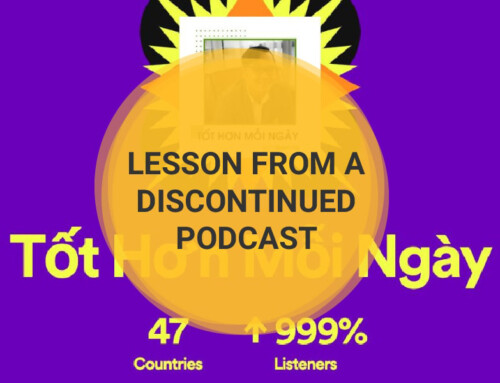A little bit more than 2 years ago, I faced a dilemma. I had to choose between accepting a full scholarship to study my Master’s Degree in Ireland, or staying in Vietnam and continuing to manage the company that I co-founded.
There were serious pros and cons for each option, but I won’t go into detail about them. After several days of torturing myself over the choices, I brought it up to my friends who were successful business owners. Their advice helped me make up my mind.
I went to Dublin to study and had the best year of my life. That year also made me a better businessman, with a stronger business foundation and the ability to lead my company through crises such as COVID-19.
Those successful friends have become my source of guidance. Their experience-based advice has saved me from wasting a lot of time, money, and effort. Thanks to them, I am confident that I am on my way to becoming successful in both career and life.
Motivational speaker Jim Rohn stated that “You are the average of the five people you spend the most time with.”
Although successful people might seem intimidating, being around them brings about many benefits. A good relationship with people who have more than us, in terms of not only wealth but also life experience, can foster our growth significantly.
Even though there are more and more opportunities to approach them such as networking events, training workshops, and mentoring programs, not many of us, especially young people, learn how to leverage those chances to build and nurture relationships with them because they lack the skills to do so.
Recognizing how lucky I am to have those valuable friends in my life, I am trying to give back to the community by becoming a mentor to young professionals and entrepreneurs. Sitting at both sides of the table helps me recognize that it is not hard to build up a good network with people who are more experienced, wealthier, or have achieved impressive feats in life. There are 5 simple practices which any of us can do right away.
The first one is to know your motivation.
To tell the truth, the idea of approaching and talking to successful people is a little bit scary. I still remember the time when I couldn’t say anything to them, or when I was too nervous to even shake their hands properly. A little bit of reflection helped me realize that I was intimidated because of my own insecurities, which were rooted in self-comparison and lack of clear motivation. Then I discovered the solution, which is to answer the question:

This question clarifies my primary reason for approaching them. I want to be friends with them not because of cool pictures on social media, where I tag them to show off to the world. I also do not want to gain their money, because I’m not selling anything to them or asking for any favors. Successful people are smart; they can quickly recognize those intentions and decide to not waste their time.
What I want to gain from those relationships is their wisdom, and the only thing I want to sell is my eagerness to learn. That motivation puts me in a much easier position where I don’t have to dress up or talk smart to impress those people; instead, what I need to do most frequently is to ask for their opinion and then pay close attention to what they have to share. Because those feelings and actions are authentic, I don’t have to try too hard and put a lot of pressure on myself and on the relationship that I am trying to build.
The next practice is to be clear on what you want to learn.

This second question directs me to the people who I think can help me the most because they have the attributes that I am working hard to develop. It also helps me transform generic and forced conversion into valuable coaching or mentoring sessions. I can focus on describing the specific situation in which I am not doing well, and in turn, they are able to give me actionable insights and feedback to change.
Being a mentee and a mentor at the same time, I can testify that people love to advise other people who genuinely want to learn and can benefit from their experiences and opinions. These 2 simple questions have the power to make us more confident and effective in starting and maintaining the relationships we want to have.
However, there is one thing that successful people love more than teaching the right person, and that is seeing the results of their contribution. And it leads me to my third practice, which is:
To show your appreciation.
One of the most joyful moments of being a mentor, a manager, or even a friend, is to know that there is a person that has grown because of my contribution. It took time and energy to listen to the other side’s situation and then share my most relevant stories or the most appropriate advice. Hence, I am proud to know that my effort has paid off. And this feeling has been validated by my mentors and successful friends.
So, please share with your friends how you applied their teaching into your life and your work, and the results from those actions. You can tell them face to face, via email, messenger, or in a thank-you note. That simple act of appreciation will make their day and give them a joy that money can’t buy. By doing so, you will strengthen your relationships with them.
Best practice number 4 is to care.
A relationship is a two-way street. For it to develop further, you need to add more value to their lives. It doesn’t need to be much; there is a simple question that has helped me with this tip:

Successful people are normal people, too. There is always something that they want and need. Some examples might be:
- They want to be able to run longer miles without interruptions
- They are looking for a new helper to help clean their house
- They are having back pain and are looking for a solution
And the list goes on with other daily normal concerns.
If by chance you know how to help with those things, or you know other people who can help, please share those information with them. This simple action shows that you care for them, by listening to their stories or by observing them. This act of caring not only helps to bring more value to their lives but also strengthens your current relationships.
Believe it or not, by giving a book on Buddhism to a businessman who was very interested in that topic, I started a great friendship that is still going strong.
And the final practice is to be patient.
Successful people are busy. It is normal for them to prioritize their business, family, or personal hobbies over you. So if some of them do not respond to your request, don’t take it personally and be discouraged.
Good things take time. Many people will appreciate your enthusiasm and want to contribute to your growth. Keep seeking, asking, and adding values to their lives sincerely. After a while, you will soon have a network of successful people who can help you grow tremendously.
It is no exaggeration to say that my relationships with successful people are among my most important assets in life. By learning from those friends, I am able to save a lot of time and money from doing the wrong things or going in the wrong direction. Moreover, they are living the life that I aspire to, with loving families, great hobbies, and excellent health. By hanging out with them, I slowly understand why they have what they have, so I can change my mindset and behavior accordingly. I have accumulated those resources over the years by applying the five practices that I have shared with you today.

Those are 5 simple and actionable tips that any of us can do. Let’s apply them today to develop great relationships that can transform your career and your life.
Thank you.




